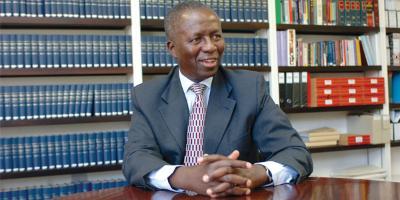Moseneke on a restless South Africa
-
It is wrong to approach the transition as a total sell out arrangement. It would be an under representation of history, says former ConCourt judge Moseneke.
The closing speech delivered by retired Constitutional Court Judge Dikgang Moseneke at a Wits symposium reflected on some of the contentious issues confronting a once again restless South Africa.
 Moseneke shared his thoughts on the country after spending a day with emerging and established lawyers, activists and scholars at a symposium hosted in his honour.
Moseneke shared his thoughts on the country after spending a day with emerging and established lawyers, activists and scholars at a symposium hosted in his honour.
In his opening remarks he tasked emerging lawyers and activists at the symposium to continue to dismantle oppressive structures that his generation fought against.
“The themes that have emerged are the themes of our time and they are the themes of our revolution, and I am afraid they will define also your generational vision. As you know, Fanon very famously said: ‘Every generation has a duty to discover its own mission, its own generational mission, and it is open to them to fulfil that mission or betray it’.”
Jointly organised by the Law Schools of both Wits University and the University of Cape Town, the symposium focused on two broad themes that characterise Justice Moseneke, namely ‘the Activist Judge’ and ‘the Intellectual Judge’. View programme.
Snippets of his speech appear below as well as the podcast.
On political accountability
There is a need to go “back to the basics of mobilising grassroots people to understand issues that truly confront them and how, ultimately, these issues should become so prime in their lives, that they should know that electoral accountability is the highest form of accountability."
Ultimately even if you land up with a Trump, you still have the duty to think about how to use limited tenure, politically, in order to advance social objectives that are always in dispute in any society. Unless we get our people to understand that in fact, ultimately, they make the call, we are going to find that the struggle will go on for much longer.”
Land
“Land is the signature form of oppression in our land. It is historical, it is present and represents dignity.”
Pre-1994 negotiations and economic power
There are ongoing accusations that anti-apartheid leaders compromised too much during the pre-1994 negotiations that charted the way forward for the political and economic future of South Africa. Moseneke, who was part of drafting the Constitution, shared his views on this matter:
“No revolution is linear. No true effort to transform any society radically is ever on a straight trajectory. Something happened in 1994. There was a transition, and it was intended to be a two stage transition, and a certain modicum of political power was transferred to the people, and indeed we wrote up a Constitution that held certain promises – not entirely perfect. So it’s wrong to approach the transition as a total sell-out arrangement. It would be an under-representation of history.”
Moseneke recounted a conversation between him and Nelson Mandela in which the first President of a democratic South Africa addressed the accusation by Peter Mokaba:
”My generation's mission was to bring political freedom. Your mission is to go and take state power and do with it what is good for our people. And we failed to do so.”
Fees Must Fall
“I agree they must fall. Fees must fall. The cry is legitimate and it is a cry against a near failed transformative project. All the markers of oppression like race, gender and class are still very much in place by and large. We have failed collectively as a state and society to erode.”
Moseneke criticised the violence that accompanied the 2016 student protests: “Violence diminishes the moral strength and the legitimacy of a claim that hangs together with many other valid claims, of a state that has failed to rise to our collective promises.”
He appealed to the current students who are only at universities for a short period of time while studying not to “close the space for radicalisation for other students to raise important issues in society.”
Listen to the closing remarks by Moseneke.
